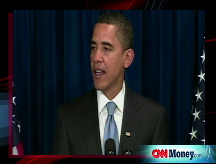U.S. deficit soars to $485.2 billion
The budget gap in first three months of the fiscal year surpasses the level recorded for all of '08.
NEW YORK (CNNMoney.com) -- The federal budget deficit expanded by $83.6 billion in December, the Treasury Department reported Tuesday, bringing the total deficit for the first three months of the 2009 fiscal year to $485.2 billion.
By comparison, the budget deficit for all of fiscal year 2008 was $455 billion. In fiscal 2007, it was $161 billion.
The deficit has ballooned in the first quarter of the fiscal year as the Treasury, Federal Reserve and FDIC began spending record amounts of the $7.2 trillion committed so far to bailouts, financial stabilization efforts and capital investments. The numerous emergency actions began as a result of the credit crisis that started in mid-September.
A decline in tax receipts, stemming from the 1.5 million jobs lost in the first three months of the fiscal year, also contributed to the soaring deficit.
Treasury has collected $255.3 billion in individual income taxes so far this fiscal year, down 6.7% from $273.7 billion in the first quarter of last year.
Businesses contributed just $50.4 billion in taxes in the first three months of the year, 45.5% less than the $92.5 billion they paid Treasury at this point last year.
Budget experts have projected that the federal deficit for this fiscal year, which began Oct. 1, will be nearly $1.2 trillion. But that total doesn't count the economic recovery package that President-elect Barack Obama has started to push forward.
Economists and Obama advisers expect the government to commit at least $775 billion to stimulate economic activity. The effect on the budget deficit will likely be substantial, but less than the upfront cost, as infrastructure programs take time to implement.
Still, even noted deficit hawks have said that, given the enormous depth of the recession, policies that increase the deficit now are less of problematic than letting the economy deteriorate further.
The Treasury reported it committed another $51.1 billion to the Troubled Asset Relief Program in December, bringing the total outlays committed to the financial rescue package to $242.5 billion in the first three months of the fiscal year.
Congress has allotted $700 billion to the program, but has only made the first $350 billion available so far. President Bush, on the request of President-elect Obama, asked Congress on Monday to release the remaining funds.
Treasury has also paid $13.8 billion so far this year on housing and economic recovery programs, unchanged from the previous month.
According to the report, Treasury also paid nearly $43.5 billion in interest on its outstanding debt in the first quarter of the fiscal year, down from nearly $58 billion paid during the same period a year ago, reflecting the dramatic drop in interest rates on Treasury bonds.
Treasury has been issuing bonds at a record pace in the past few months to pay for its massive bailout programs. Although the Treasury adds to the deficit whenever it issues bonds, that issuance has come cheap recently as interest rates have plummeted to record lows.
How do you think Barack Obama's presidency will affect you and your wallet? What can he do to help you - and others - in these trying economic times? E-mail us at realstories@cnnmoney.com, and your thoughts could be part of an upcoming story. ![]()



